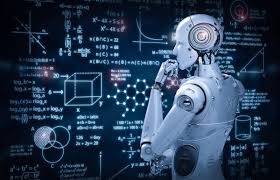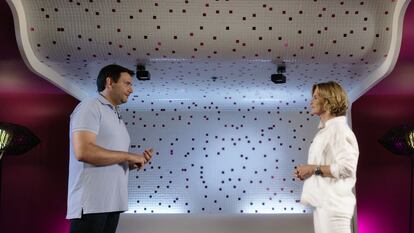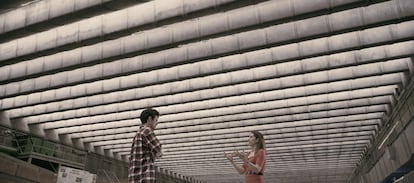The miniseries 'Alter Ego', on TVE, discusses utopian and apocalyptic visions of artificial intelligence.

It may be true that it will save us or enslave us, but the third way is more convincing, that of the pragmatists who want to prevent their abuses now.

Until that arrives, it is daring to maintain that what machines do today is think, although AI is taking very rapid steps. For now, we still need to think, which some do more brilliantly than others. The documentary miniseries Alter Ego. Invisible Intelligence brings together, in three chapters, the human minds that best understand and explain what is already here and what will come in the next decade with AI. The most groundbreaking, for better or worse.
Directed by Beatriz Pérez de Vargas and premiered on RTVE Play before its next broadcast on La 2, Alter Ego brings two powerful currents of thought about thinking machines into dialogue: the utopian and the catastrophic. Two presenters delve into each trend on their own. Almudena Ariza (when will she have done this, if we see her every day in Ukraine, Israel or Palestine?) looks for voices that calm us and excite us, because they believe that AI is going to save us from cancer and the climate crisis, it will free us from boring jobs and it will give us more free time; It will improve our lives, which will be very long. Carles Tamayo, on the other hand, visits the doomsayers: AI will delve into mass surveillance, spread hoaxes and lies, make public debate more toxic, will be used for war and repression (so far nothing that is not already happening), But it will also take away our jobs and power, and in the end we humans will be left in the gutter, we will be superfluous, except for that super elite that manages the new shed. Each chapter is situated on a temporal plane: the first tells what is already happening, the other two take us to what is expected in 2028 and 2033, and each one is more interesting, and disturbing, than the previous one.

The engineer and researcher Nuria Oliver explains very well the sins that algorithms already commit: the lack of veracity (hoaxes and deep fake) , the lack of diversity (that Netflix always recommends us the same type of series, as Facebook and lock us in political bubbles), the lack of transparency (AI gives us an answer, but we never understand where it comes from), and the enormous accumulation of power in a handful of companies. The debate that is already here is how to introduce ethics into cold machines, how to guarantee that their criteria respond to our values. This involves, of course, regulation, which is beginning to take steps, more decisive in Europe than in the United States; It is more difficult to penetrate what China plans in this regard.
We hear very new ideas. Perhaps technical training won't matter as much in the near future: everything technical will be done by machines, and what humans will need most is critical thinking. A person without much training will be able to do tasks currently reserved for scientists. But there are fears that we didn't have yet and they appear here: what if anyone could make a nuclear bomb in their garden? The future of employment is another of the great debates: some see a massive extermination of jobs coming; Others predict a time with more balance between work and leisure, which will leave us more space to interact with humans, which is already beginning to be scarce.
Of course, even utopia can turn into a nightmare. Several experts speculate about what Artificial General Intelligence will be. Maybe then we will give up and give him political power, convinced that he will do better than our improvable authorities. Attention: we would have ended democracy, this would be a real technocracy. For Antonio Torralba, a researcher at MIT, there is no need to go that far: perhaps artificial intelligences will not be good political leaders, he says, but they will be excellent advisors. There are also those who believe that we should not fear that last step, from advising to directing. That we will delegate decisions to the IAG and she will convince us that she does it better until she makes them all. It could happen that some countries do it sooner (authoritarians have it easier), and their success drags down the others.
José Ignacio Latorre, a quantum physicist who works on neural networks, prefers to imagine that there will be various superintelligence, not a single all-powerful one. But even so, relations of dependency even greater than the current ones will be created between the most advanced countries and the others. “When humans discovered anesthesia, no one wanted to go back to the 12th century and have a real toothache. When AI makes your life easier, you won't want to part with it. You won't see the danger it contains,” he says. A sentence that is disturbing: “I have seen how everything I thought has been overcome.”
Not everything we hear falls into those categories of utopian and apocalyptic. Among so many announcements of almost science fiction futures, the third way, that of the pragmatists, sounds sensible. They are the ones who believe that there will be important advances, yes, but it is better for us to focus today on the abuses that are already being committed. Mathematician Cathy O'Neil is one of the most lucid: “The mistake is to think that AI is self-aware, when it was always created and used by humans against other humans. Singularity is a marketing term so that the owners of this technology do not take responsibility. “That conspiracy theory distracts us from the real problems.”
Perhaps Sam Altman is generating excessive expectations that excite his investors. Even if so, this does not mean that extraordinary things will not happen. Artificial intelligence will be so invasive, it will be at all levels of bureaucracy and our activities, that we will not be able to resist it. The last toy will, thus, be a leap forward from technocapitalism or surveillance capitalism, that model based on the massive extraction of our data to do business with them, that is, with us. We've been doing that for a few decades now. It's going to accelerate. Fasten seat belts.

Directed by Beatriz Pérez de Vargas and premiered on RTVE Play before its next broadcast on La 2, Alter Ego brings two powerful currents of thought about thinking machines into dialogue: the utopian and the catastrophic. Two presenters delve into each trend on their own. Almudena Ariza (when will she have done this, if we see her every day in Ukraine, Israel or Palestine?) looks for voices that calm us and excite us, because they believe that AI is going to save us from cancer and the climate crisis, it will free us from boring jobs and it will give us more free time; It will improve our lives, which will be very long. Carles Tamayo, on the other hand, visits the doomsayers: AI will delve into mass surveillance, spread hoaxes and lies, make public debate more toxic, will be used for war and repression (so far nothing that is not already happening), But it will also take away our jobs and power, and in the end we humans will be left in the gutter, we will be superfluous, except for that super elite that manages the new shed. Each chapter is situated on a temporal plane: the first tells what is already happening, the other two take us to what is expected in 2028 and 2033, and each one is more interesting, and disturbing, than the previous one.

The engineer and researcher Nuria Oliver explains very well the sins that algorithms already commit: the lack of veracity (hoaxes and deep fake) , the lack of diversity (that Netflix always recommends us the same type of series, as Facebook and lock us in political bubbles), the lack of transparency (AI gives us an answer, but we never understand where it comes from), and the enormous accumulation of power in a handful of companies. The debate that is already here is how to introduce ethics into cold machines, how to guarantee that their criteria respond to our values. This involves, of course, regulation, which is beginning to take steps, more decisive in Europe than in the United States; It is more difficult to penetrate what China plans in this regard.
We hear very new ideas. Perhaps technical training won't matter as much in the near future: everything technical will be done by machines, and what humans will need most is critical thinking. A person without much training will be able to do tasks currently reserved for scientists. But there are fears that we didn't have yet and they appear here: what if anyone could make a nuclear bomb in their garden? The future of employment is another of the great debates: some see a massive extermination of jobs coming; Others predict a time with more balance between work and leisure, which will leave us more space to interact with humans, which is already beginning to be scarce.
Of course, even utopia can turn into a nightmare. Several experts speculate about what Artificial General Intelligence will be. Maybe then we will give up and give him political power, convinced that he will do better than our improvable authorities. Attention: we would have ended democracy, this would be a real technocracy. For Antonio Torralba, a researcher at MIT, there is no need to go that far: perhaps artificial intelligences will not be good political leaders, he says, but they will be excellent advisors. There are also those who believe that we should not fear that last step, from advising to directing. That we will delegate decisions to the IAG and she will convince us that she does it better until she makes them all. It could happen that some countries do it sooner (authoritarians have it easier), and their success drags down the others.
José Ignacio Latorre, a quantum physicist who works on neural networks, prefers to imagine that there will be various superintelligence, not a single all-powerful one. But even so, relations of dependency even greater than the current ones will be created between the most advanced countries and the others. “When humans discovered anesthesia, no one wanted to go back to the 12th century and have a real toothache. When AI makes your life easier, you won't want to part with it. You won't see the danger it contains,” he says. A sentence that is disturbing: “I have seen how everything I thought has been overcome.”
Not everything we hear falls into those categories of utopian and apocalyptic. Among so many announcements of almost science fiction futures, the third way, that of the pragmatists, sounds sensible. They are the ones who believe that there will be important advances, yes, but it is better for us to focus today on the abuses that are already being committed. Mathematician Cathy O'Neil is one of the most lucid: “The mistake is to think that AI is self-aware, when it was always created and used by humans against other humans. Singularity is a marketing term so that the owners of this technology do not take responsibility. “That conspiracy theory distracts us from the real problems.”
Perhaps Sam Altman is generating excessive expectations that excite his investors. Even if so, this does not mean that extraordinary things will not happen. Artificial intelligence will be so invasive, it will be at all levels of bureaucracy and our activities, that we will not be able to resist it. The last toy will, thus, be a leap forward from technocapitalism or surveillance capitalism, that model based on the massive extraction of our data to do business with them, that is, with us. We've been doing that for a few decades now. It's going to accelerate. Fasten seat belts






